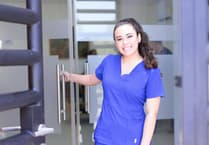A Welsh Government commissioned report has found that councils not charging the maximum allowed premium on second homes may be weakening their case to shut a tax “loophole”.
The 81 page report, compiled by Porthmadog-based academic Dr Simon Brooks, recommends 12 policy changes after considering the ongoing impact on mainly Welsh-speaking areas.
Existing legislation allows councils to charge a council tax premium of up to 100 per cent on second and long term empty homes, with eight of the 22 currently charging to some extent.
But while two are proposing to levy the maximum allowed from April – namely Swansea, with Gwynedd set to vote on the measure on Thursday (March 4) – not one currently charges more than half of this figure, with a 25 per cent premium in Conwy and Ceredigion, 35 per cent on Anglesey and 50 per cent in Gwynedd, Denbighshire, Flintshire, Powys and Pembrokeshire.
Several authorities have so far resisted the maximum premiums – essentially doubling the charge paid if it were not a second home – fearing it would spurr on more to explore ways of avoiding paying council tax at all.
Current rules mean that if a second home is available for commercial letting as self-catering accommodation for 140 or more days in a year, and actually let for at least 70 days, it qualifies for non-domestic rates rather than council tax.
This, according to the Welsh Local Government Association (WLGA), often results in them also being eligible for Small Business Rate Relief, often mean they end up paying no taxes at all into the Welsh public purse.
But while acknowledging that councils are also calling for changes to the planning system – giving them the power to insist that planning permission is needed to turn a normal dwelling into a second home – the report describes the current situation as a “strange one.”
“This would be quite a fundamental change to public (planning) policy,” it notes.
“Of course such changes could be considered, and yet the argument made by councils would be stronger if they themselves used their taxation powers in full. To date, that has not happened.
“The reason often given by local councils for not using their taxation powers in full is a so-called legislative ‘loophole’ which allows second home owners to avoid paying council tax altogether by registering for non-domestic rates instead. This is an oft- repeated claim.
“However, there is no evidence that there is a loophole in the sense that people are breaking the law. If people were breaking the law then it would be in the public interest for them to be prosecuted.
“The word ‘loophole’ is unfortunate as it creates confusion as to what is actually taking place.”
However, Dr Brooks goes on to recommend that the Welsh Government should look at amending planning policy,”hand in hand” with efforts across affected local authorities to charge the full premium.
“This report acknowledges that increasing the premium on second homes is not risk- free,” he went on to write.
“However, instead of employing this argument as a reason not to do so, it would be more sensible for the premium to be increased, and for the Welsh Government to adopt parallel policies at the same time to try to persuade owners not to transfer their property from the council tax list to non-domestic rates.
“Much recent public debate about second homes has proposed making far-reaching changes to planning law. However, from a public policy perspective, it becomes more difficult to justify a change to planning legislation if existing taxation powers are not used.
“By not charging the full premium for second homes, county councils that are concerned about the situation are weakening their case.
“It is in the public interest therefore that county councils in areas where there is a high number of second homes use their taxation powers fully.
“There are indications that some local authorities in relevant parts of Wales are about to do this, and others are moving in that direction.
“This, in turn, justifies an appropriate response by the Welsh Government including full consideration of other policy options, including those discussed in this report.”
Other recommendations include Welsh Government holding a consultation on exempting short-term holiday accommodation from being eligible for small business rates relief and a trial of new planning laws that would see a new use class for second homes that would echo already established calls requiring planning permission to be in place before converting a main residence into a second home or short-term holiday accommodation.
Also recommended is varying the higher rates of the land transaction tax – or stamp duty – potentially adding a further rate to the tax of up to 4 per cent of the value of the second property in some parts of Wales, or devolving such decisions to the relevant local authority.
Dr Brooks had been originally commissioned to report on taxation and planning policies on second homes in Wales and Cornwall after receiving a grant from the Coleg Cymraeg Cenedlaethol, but the research was later expanded on the Welsh Government’s request, scrutinising some wider issues and making future policy recommendations.
But on the post-Covid and Brexit world, Dr Brooks warned that competition for countryside housing is only likely to increase, pointing to examples where an employee of a Manchester, Bristol or London based company “could spend their weekends in rural Wales, and a fair amount of the week too,” only commuting to the main office when required.
“It would not be necessary to be in the city office from nine to five, Monday to Friday,” he wrote.
“It might be possible to enjoy ‘long weekends’ in Wales, working on a computer in the second home on days adjacent to the weekend proper. Establishing working patterns like these would increase the demand for second homes in rural Wales significantly.
“As in the case of Brexit, there is evidence that some of these probable long-term social changes have already begun. Last summer was one of the busiest ever seen for tourism in counties with a high number of second homes, such as Pembrokeshire, Ceredigion, Gwynedd and Anglesey.
“There were anecdotal reports that houses on the open market in attractive seaside villages were purchased very quickly; many as second homes. It is probable that some of the upheaval during the summer of 2020 was due to temporary factors associated with Covid-19.
“However, it would be naive to think that at least some of these supposedly ‘short-term’ changes will not continue in the future.”
In a joint statement the respective ministers for the Welsh language and housing, Eluned Morgan and Julie James, said: “This is a well-balanced report, providing an in-depth analysis of the multi-faceted challenges, including those related to planning, tourism, taxation and the sustainability of our communities.
“It also recognises there are roles for both the Welsh Government and local authorities in developing effective solutions.
“The Welsh Government is keen to find balanced and practicable whole-system solutions to ensure that our young people are able to continue to live in their local communities, as well as ensuring communities’ long-term sustainability and vitality.
“Since the pandemic, we’ve seen growing concerns about the effects that large numbers of second homes can have on some of our communities and, in particular, on the long-term sustainability of our Welsh-speaking heartlands. We are concerned for the future of these communities and welcome the linguistic considerations in the report.
“We wish to thank Dr Brooks for his detailed work on this report, and also the Coleg Cymraeg Cenedlaethol and Academi Hywel Teifi, Swansea University for commissioning and funding this piece of work.”




